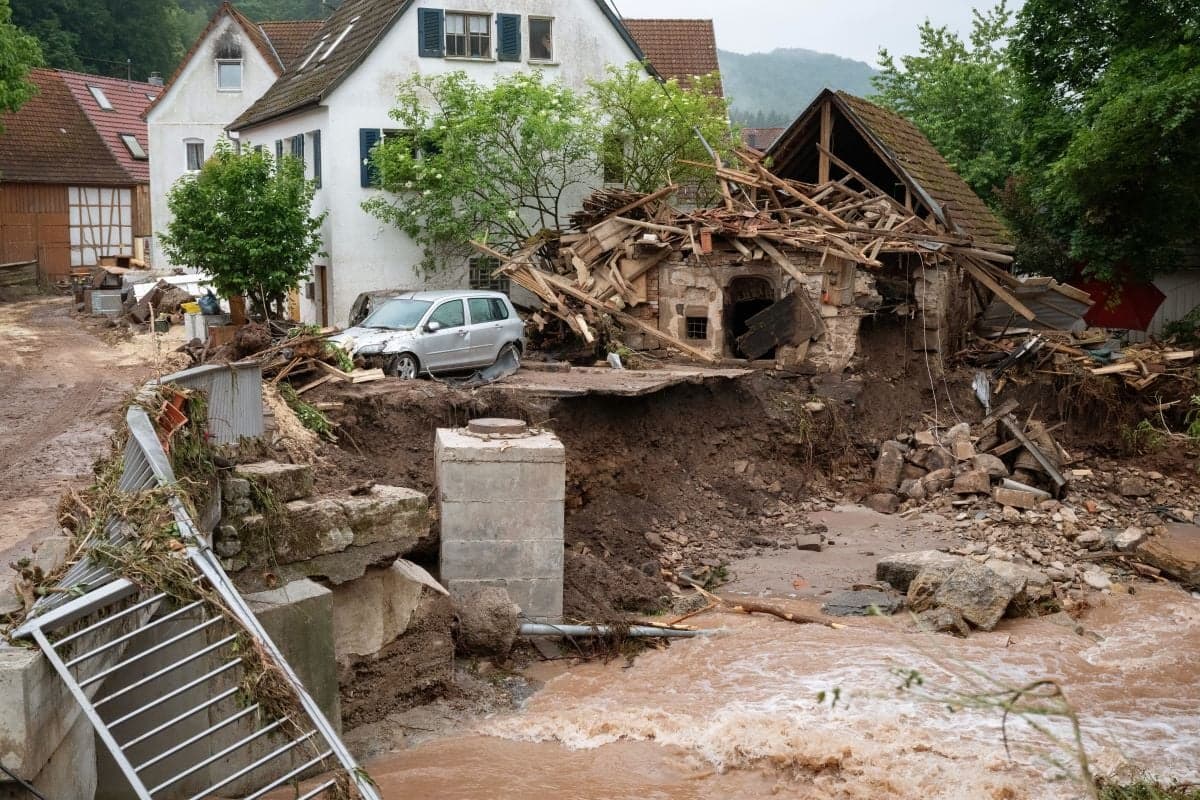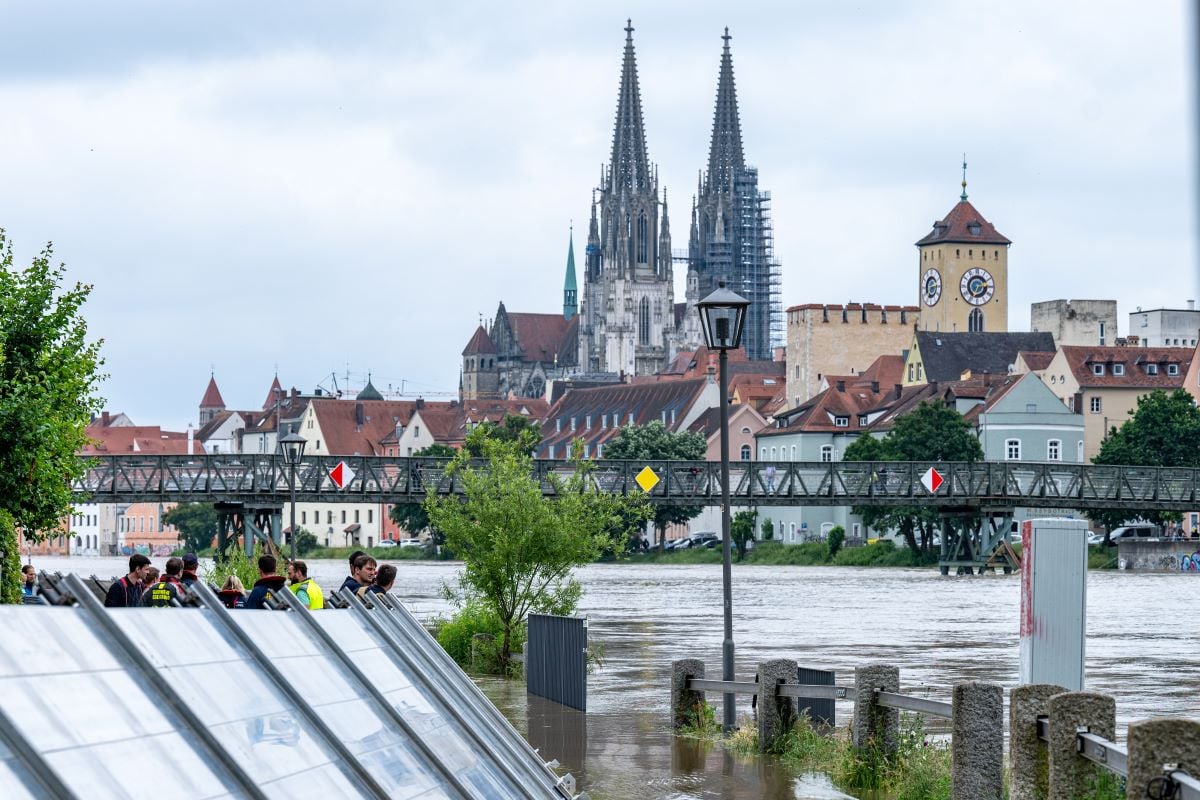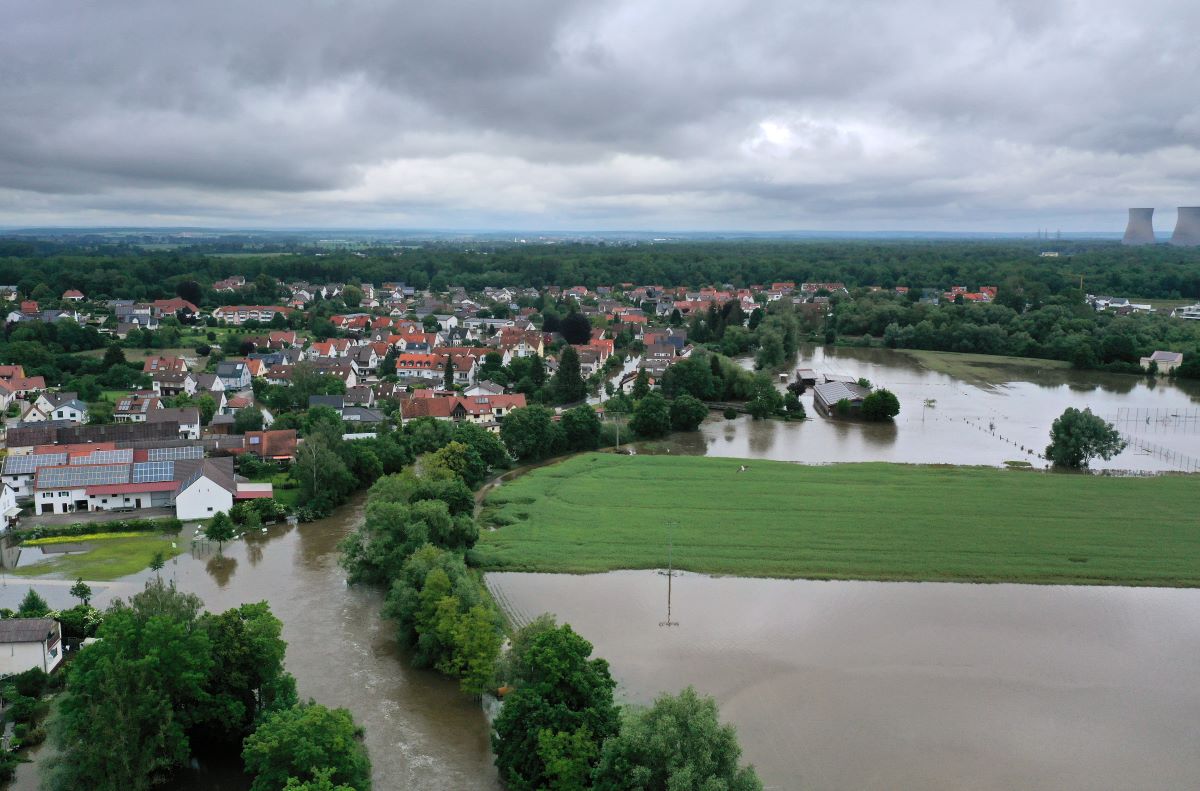LATEST: Evacuations and widespread disruption as southern Germany battles floods

Southern Germany is still dealing with major flooding. In some places evacuations continued through the night, in others the extent of the damage is finally being seen. Rail traffic is still at a standstill on some lines.
Flooding hazards continue in eastern Bavaria, where people have been evacuated from their homes Monday night and Tuesday morning.
In other places, the consequences of the flooding in the south are becoming more visible as storm waters recede.
Thousands of emergency workers are still in action. Four people have died so far.
Rail traffic disruptions
Deutsche Bahn is seeing continued train cancellations due to the severe weather.
As of Tuesday at 8:00 am, the following routes were not passable:
- Stuttgart - Ulm - Augsburg - Munich between Ulm and Augsburg
- Nuremberg - Donauwörth - Augsburg - Munich between Donauwörth and Augsburg
- Munich - Memmingen - Lindau between Buchloe and Memmingen
- Ulm - Memmingen - Kempten
Additionally, individual train cancellations are occurring throughout southern Germany, and trains that are running are seeing high occupancy.
Customers with a ticket for today, who would like to reschedule their journey can do so. Check your connection on DB’s website, in the navigator app, or by calling the free hotline (08000996633) before travelling.
Local rail traffic is also being disrupted in some areas.
Several train connections of the rail operator Agilis will be cancelled on Tuesday due to the flooding along the Danube. This applies mainly to the Ingolstadt - Donauwörth - Gundelfingen and Ingolstadt - Ulm routes, according to an announcement on Monday evening.
Ongoing evacuations
In Regensburg, 200 people had to leave their homes late Monday evening.
In the Upper Bavarian district of Rosenheim, a state of disaster had also been declared. Citizens were warned to stay home Monday night, and schools and kindergartens in affected communities remain closed today.

Water levels on the Danube River are very close to reaching the height of the river banks in some cities. For days, helpers in Bavaria and Baden-Württemberg have been battling the flood and its consequences. Photo: picture alliance/dpa | Armin Weigel
Evacuations also took place in the municipalities of Raubling and Rohrdorf. It was not initially known how many people were affected.
In Passau, streets in the old town are closed to traffic. With the Danube currently twice as high as normal, and water levels in the city’s three rivers expected to continue rising through at least the afternoon, flooding can be expected to worsen.
Meteorologist Dominik Jung told BILD: "The risk of dike breaches is growing. At Ingolstadt and downstream, the water will probably continue to rise until tomorrow."
City associations want more money for flood protections
The federal and state governments must "significantly expand the funds for flood and disaster protection again - permanently and not ad hoc via special programs," said the chief executive of the Association of Cities, Helmut Dedy, to RND.
He pointed to the growing expenditure of cities and municipalities for measures such as dam construction, greening and irrigation – all increasingly urgent due to worsening climate change.
The President of the Federal Agency for Technical Relief (THW), Sabine Lackner, told the Augsburger Allgemeine about the necessary investments: "With around 400 million euros for the current year… [we’re working with] about four euros per German citizen per year, so not really much. Interior Minister Nancy Faeser herself says that considerable investments are needed. In this respect, politicians have a duty."
How flooding is intensified by climate change
Germany has seen occasional extreme floods for centuries, but climate experts say floods are happening more often with more intensity due to human-caused climate change.
The current flooding came as a result of a ‘Vb low-pressure system’, which tends to come to Germany from northern Italy after absorbing a lot of moisture from the Mediterranean. The high heat and moisture content of the Mediterranean air slows down the speed of the storm, causing it to release a longer heavy rainfall over a region.
ARD meteorologist, Karsten Schwanke, explained on Tagesschau24 that there is a historical record of floods brought by Vb low pressure storms: “Nevertheless, there is a very clear connection to climate change, because higher temperatures mean that the atmosphere can store more water vapour."

Meadows and farmland are flooded by the high water of the Mindel River. For days, helpers in Bavaria and Baden-Württemberg have been battling the flood and its consequences. Many small communities are affected, and in some places the situation is even getting worse. Photo: picture alliance/dpa | Karl-Josef Hildenbrand
Chancellor Scholz acknowledged the impact of climate change when he visited flood-stricken parts of Bavaria: "This is an indication that something is up here,” he said, adding that the floods were “A warning we must take with us”.
Climate researcher Niklas Höhne from the New Climate Institute told Tagesschau24: "We see that the global temperature is extremely high - higher than ever measured. That's why the oceans are warmer than ever."
Warmer air and ocean temperature cause more evaporation, and more water to be carried in the atmosphere. Then all of that water comes down again at some point.
“These extreme events with rain are clearly effects of the climate crisis and, harbingers of what is in store for us if we do not finally change course now and reduce greenhouse gas emissions," Höhne explained.
With reporting by DPA
Comments
See Also
Flooding hazards continue in eastern Bavaria, where people have been evacuated from their homes Monday night and Tuesday morning.
In other places, the consequences of the flooding in the south are becoming more visible as storm waters recede.
Thousands of emergency workers are still in action. Four people have died so far.
Rail traffic disruptions
Deutsche Bahn is seeing continued train cancellations due to the severe weather.
As of Tuesday at 8:00 am, the following routes were not passable:
- Stuttgart - Ulm - Augsburg - Munich between Ulm and Augsburg
- Nuremberg - Donauwörth - Augsburg - Munich between Donauwörth and Augsburg
- Munich - Memmingen - Lindau between Buchloe and Memmingen
- Ulm - Memmingen - Kempten
Additionally, individual train cancellations are occurring throughout southern Germany, and trains that are running are seeing high occupancy.
Customers with a ticket for today, who would like to reschedule their journey can do so. Check your connection on DB’s website, in the navigator app, or by calling the free hotline (08000996633) before travelling.
Local rail traffic is also being disrupted in some areas.
Several train connections of the rail operator Agilis will be cancelled on Tuesday due to the flooding along the Danube. This applies mainly to the Ingolstadt - Donauwörth - Gundelfingen and Ingolstadt - Ulm routes, according to an announcement on Monday evening.
Ongoing evacuations
In Regensburg, 200 people had to leave their homes late Monday evening.
In the Upper Bavarian district of Rosenheim, a state of disaster had also been declared. Citizens were warned to stay home Monday night, and schools and kindergartens in affected communities remain closed today.

Evacuations also took place in the municipalities of Raubling and Rohrdorf. It was not initially known how many people were affected.
In Passau, streets in the old town are closed to traffic. With the Danube currently twice as high as normal, and water levels in the city’s three rivers expected to continue rising through at least the afternoon, flooding can be expected to worsen.
Meteorologist Dominik Jung told BILD: "The risk of dike breaches is growing. At Ingolstadt and downstream, the water will probably continue to rise until tomorrow."
City associations want more money for flood protections
The federal and state governments must "significantly expand the funds for flood and disaster protection again - permanently and not ad hoc via special programs," said the chief executive of the Association of Cities, Helmut Dedy, to RND.
He pointed to the growing expenditure of cities and municipalities for measures such as dam construction, greening and irrigation – all increasingly urgent due to worsening climate change.
The President of the Federal Agency for Technical Relief (THW), Sabine Lackner, told the Augsburger Allgemeine about the necessary investments: "With around 400 million euros for the current year… [we’re working with] about four euros per German citizen per year, so not really much. Interior Minister Nancy Faeser herself says that considerable investments are needed. In this respect, politicians have a duty."
How flooding is intensified by climate change
Germany has seen occasional extreme floods for centuries, but climate experts say floods are happening more often with more intensity due to human-caused climate change.
The current flooding came as a result of a ‘Vb low-pressure system’, which tends to come to Germany from northern Italy after absorbing a lot of moisture from the Mediterranean. The high heat and moisture content of the Mediterranean air slows down the speed of the storm, causing it to release a longer heavy rainfall over a region.
ARD meteorologist, Karsten Schwanke, explained on Tagesschau24 that there is a historical record of floods brought by Vb low pressure storms: “Nevertheless, there is a very clear connection to climate change, because higher temperatures mean that the atmosphere can store more water vapour."

Chancellor Scholz acknowledged the impact of climate change when he visited flood-stricken parts of Bavaria: "This is an indication that something is up here,” he said, adding that the floods were “A warning we must take with us”.
Climate researcher Niklas Höhne from the New Climate Institute told Tagesschau24: "We see that the global temperature is extremely high - higher than ever measured. That's why the oceans are warmer than ever."
Warmer air and ocean temperature cause more evaporation, and more water to be carried in the atmosphere. Then all of that water comes down again at some point.
“These extreme events with rain are clearly effects of the climate crisis and, harbingers of what is in store for us if we do not finally change course now and reduce greenhouse gas emissions," Höhne explained.
With reporting by DPA
Join the conversation in our comments section below. Share your own views and experience and if you have a question or suggestion for our journalists then email us at [email protected].
Please keep comments civil, constructive and on topic – and make sure to read our terms of use before getting involved.
Please log in here to leave a comment.